|
Loading
|
|
|
Much Ado About Nothing
Programme Notes from Peter Gill's National Theatre production, 1981
Compiled by Shirley Mathews, Simon Usher and John Burgess
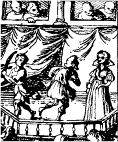 |
| One of the earliest printed views of a Jaconean stage performance, c 1630 |
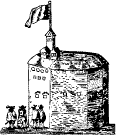 |
| The Globe theatre c 1616 |
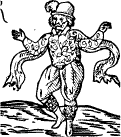 |
| Drawing of Will Kempe, 1599, dancing a morris. Kempe created the part of Dogberry. |
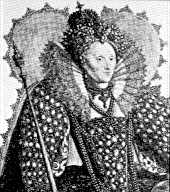 |
| Portrait of Queen Elizabeth I, c 1603, by Crispin van de Passe. |
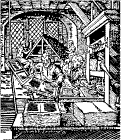 |
| Interior of 16th-century printing shop, by Jost Amman |
 |
| "Benedick and Betrice" written in Charles I's handwriting beside the play's title. (Reproduction by gracious permission of The Queen.) |
Duty
- Antonio (to Hero):
- Well, niece. I trust you will be ruled by your father.
- Beatrice:
- Yes, faith, it is my cousin's duty to make curtsy and say, 'Father, as it please you. ' But yet for all that, cousin, let him be a handsome fellow, or else make another curtsy and say, 'Father, as it please me'.
- Act 3(1)
The acknowledged duty owed by the Elizabethan gentlewoman in turn to her father and then her lord (or husband) was no courtly flourish, but a fact of life in a society structured on the Norman concept of feudal law. Eldest sons inherited to safeguard estates owing military service to the Crown. Daughters, wholly dependent on their fathers' provision through suitable marriage "alliances" became the concern of the father's overlord, since marriage portions carried with them military obligations, and these could be imperilled by a politically unwise match. A daughter's only alternative to marriage was the nunnery. A single woman had no right to promise herself in marriage without her father's consent. Once safely married, a woman could not "gainsay" her husband in court, nor plead a suit, nor make a will, without his consent. Ultimately her relationship with him, in feudal style, was subject to the laws of treason.
Spousals
- Claudio:
- I know what you would say. If I have known her,
You will say she did embrace me as a husband,
And so extenuate the 'forehand sin.- Act 4 (1)
Spousals were the first step in the contract of marriage and where, as in the play, they implied an immediate commitment to marriage, they amounted in effect, though not in name, to marriage. They might be repudiated only through the death of a partner, or by a partner embracing the religious life. Couples who lived together between spousals and the marriage ceremony would incur the censure of the Church, but their union was already recognised as valid by both Church and State. Legally, the couple were already man and wife.
Fathers And Daughters
- Leonato:
- But mine, and mine I loved, and mine I praised,
And mine that I was proud on, mine so much
That I myself was to myself not mine,
Valuing of her.- Act 4 (1)
For Shakespeare, the most intense focus of family feeling lies in the relationship between father and daughter, which comes to assume a more than naturalistic function, particularly in the late plays. In Much Ado we have early intimations of a father's grief (doubled in this play by the presence of Hero's uncle, Antonio) and a daughter's patience — the bitter and the romantic testing a comic form which by the end of the play gives a new promise of happiness.
Male Friendship
- Don Pedro (to Claudio):
- My love is thine to teach: teach it but how,
And thou shalt see how apt it is to learn
Any hard lesson that may do thee good.- Act 1 (1)
Shakespeare's work contains many portraits of intense relationships between men. How women survive in an essentially masculine world is the source of much of the telling humour in the comedies. Twelfth Night is perhaps his most profound study of sexual ambivalence, but it is a theme that runs from Love's Labour's Lost and Romeo and Juliet right through to Timon of Athens and The Winter's Tale. Much Ado is without the more overtly sexual overtones of some of the other plays, but the rough companionship of the returning soldiers and the demands of male camaraderie are essential strands in its fabric.
The Silent Woman
- Leonato:
- By my troth niece, thou wilt never got thee a husband if thou be so shrewd of thy tongue.
- Act 2 (1)
Although so disadvantaged, the Elizabethan woman provoked a remarkable flow of defensive prose, verse and oratory in the Elizabethan man, fixed in his horror of the nag and the faithless cheat, and certain that, if he did not have the one he must surely have the other. Even the Queen, in a reign which inevitably must have struck a blow for feminism, sat through a sermon to hear that women were"of two sorts, some of them wiser, better learned, discreeter, and more constant than a number of men; but another and worse sort, and the most part fond, foolish, wanton flibbergibs, tatlers, triflers, wavering, witless, without council, feeble, careless, rash, proud, dainty, nice, talebearers, eavesdroppers, rumour-raisers, evil-tongued, worse-minded, and in every way doltified with the dregs of the devil's dunghill." (Bishop John Aylmer, 1559)
Threatened with the dire penalties of picking the wrong woman, and warned there was no escape through kindness, the cautious Elizabethan, looking for "a fayre woman to his wyfe" would choose a girl "not full of tonge, and of much babling, (who) except the gravity of some matter do require that she should speak: or else an answer is to be made, keep silence." (Henry Smith, A Preparative to Marriage, 1591)
Arranged Marriages
- Beatrice:
- For hear me, Hero: wooing, wedding, and repenting, is as a Scotch jig, a measure, and a cinquepace: the first suit is hot and hasty, like a Scotch jig, and full as fantastical; the wedding, mannerly-modest, as a measure, full of state and ancientry; and then comes repentance and, with his bad legs, falls into the cinquepace faster and faster, till he sink into his grave.
- Act 2 (1)
Elizabethans were well aware that most marriages were no more than commercial transactions and that the social and domestic consequences could be acute. Until the rush to divorce (or rather "annulment" or separation) was stemmed by law in 1540, it had" mightly prevailed," for the Church courts were readily accessible to suitors who could pay. Despite the new acceptance of a married clergy, marriage was popularly held in disrepute. Increasingly, new writing with a Puritan flavour prefaced thoughts on marriage with scathing analyses of the social ills of the accepted system, as in this description of the consequences of child marriage of 1562:
"First as touching men of nobilitie, wee see dayly by experyence that they for the moste parte marrye theyre children at theyr pleasure when they are very yonge, even to such as wyll geve them most mony for them, as men used to sel theyr horses, oxen, sheepe, or any other cattel. Who that wyl geve most mony, shalbe soonest sped. This kind of marryeing hath ever bene detested. And not without cause. For whan they come once unto the perfection of age, and see other whome they coulde finde in theyr harte to fansie and love better, then many of them beginne to hate one another... and curse theyr parentes even unto the pitte of hel for the coupling of them together. Then seeke they all means possible to be divorced one from another." (Thomas Becon, Boke of Matrimony, 1562)
Marriages Of Affection
- Don Pedro: Leonato:
- She were an excellent wife for Benedick.
O Lord, my lord, if they were but a week
married, they would talk themselves mad.- Act 2 (1)
Sixteenth century writers on marriage never ceased to stress caution and prudence. But towards the end of the century, influenced by contemporary European thought and social criticism at home, their advice to young couples took on a more sophisticated guise. There was a new emphasis on real affection:
"His first duty is called Harting, that is hartie affect. As they are handfasted, so they must be hartfasted, for the eye and the toong, and the hand, will be her enemies, if the hart be not her friend."
Above all they urged compatibility:
"As one parte of the building dooth meet and fit with another; so the wife should meet with the husband, that as they are called couples, so they may be called paires, like a paire of gloves, or a paire of hose are like; so man and wife should be like, because they are a paire of friends."
(Both quotes from Henry Smith's A Preparative to Marriage, 1591).
Honour
- Benedick:
- Two of them have the very bent of honour.
- Act 4 (1)
Honour in a man is the counterpart to chastity in a woman: once lost, a reputation for either valour or chastity can never be regained.
"And even as in women honestye once stained dothe never retourne againe to the former astate: so the fame of a gentleman that carieth weapon, yf it once take a foile in any little point through dastardliness or any other reproche, doeth evermore continue shameful."
When honour is impugned, the shame must be dissolved in blood. The courtly code, heedless of the law of church or state, forbids turning the other cheek.
"Me thinketh it a meete matter to punish them... sharply, that with lyes bringe up a sclaunder upon women. And I believe that everie worthie gentilman is bounde to defend alwaies with weapon... when he knoweth any woman falslye reported to be of little honestie."
(Both quotes from Castiglione's The Courtier, 1561).
The unthinking adherence of Claudio and Don Pedro to the honour code nearly brings about disaster. It is the inner integrity of all the characters, most fully expressed in the play through Beatrice and Benedick, Dogberry and the Watch, that tempers this extravagance and brings about a newer healthier morality.
The Military Life
- Leonato:
- How many gentlemen have you lost in this action?
- Messenger:
- But few of any sort, and none of name.
- Leonato::
- A victory is twice itself when the achiever brings home full number.
- Act 1 (1)
Although brave men died and living memory could just recall the splendours of the Field of the Cloth of Gold (1520),"the Militarie profession, by meanes whereof menne were advanced to greatest renowne" became under Elizabeth"of so slender estimation, that there is no accompt neither made of it, nor any that shall professe it." (Barnaby Rich His Farewell to Militarie Profession, 1581).
Knights and gentlemen still brought men to the battlefield, but the old feudal system of raising levies through tenure was already obsolete. Men were press-ganged, even the prisons cleared, for service in the Low Countries and Ireland. The"long peace" at home was felt by old soldiers to have undermined military discipline and skill. "All men know that the chiefest warres where they have learned ainie experience hath been in the disordered and tumultuarie warres of the Lowe Countries or (peradventure) some little divers yeres past, in the intestine and licentious warres of France." (Certain Discourses written by Sir John Smythe, Knight, 1590).
The army, still an occasional force for there was no standing (or regular) army until the Civil War, was ill-equipped and its officers corrupt. But heroism in the field was still found in courtly circles. Sir Philip Sidney (1554-1586), one of the earliest soldier-poets, lent part of his armour to a comrade and died an unnecessary death in an unnecessary action in the Low Countries, presaged in his love poetry:
"Fly, fly, my friends! I have my death's wound — fly!
See there that boy, that murthring boy I say,
Who like a thief hid in dark bush doth lie
Till bloody bullet get him wrongful prey."